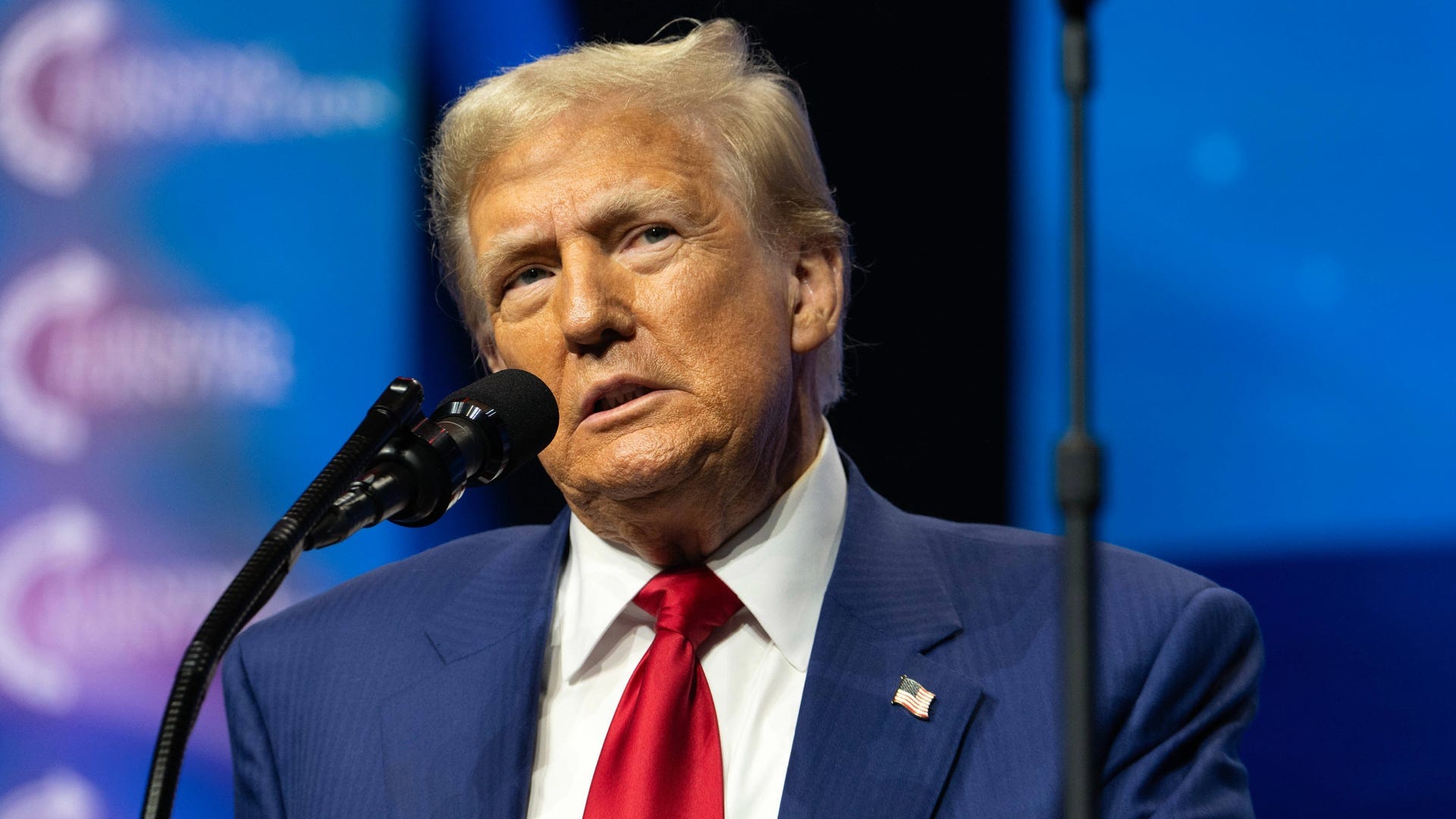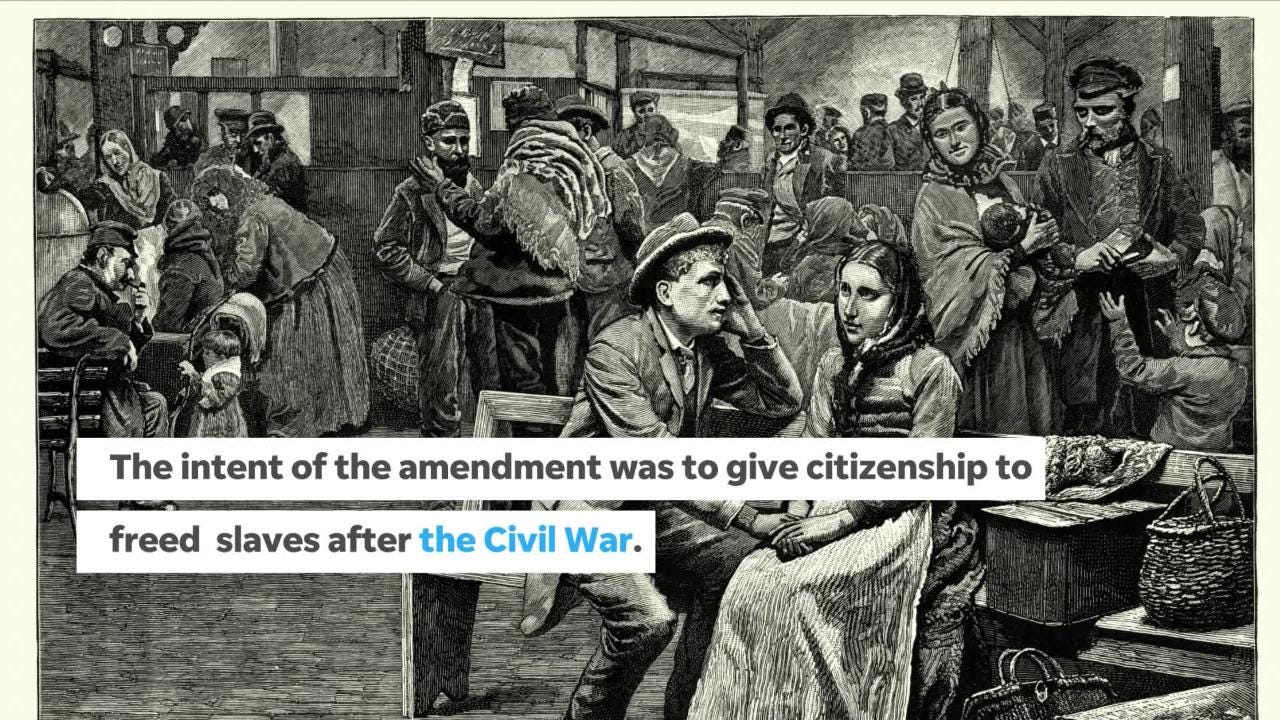Trump vows to end birthright citizenship on 1st day. What does that mean? What about Barron?

In a wide-ranging interview with NBC's "Meet the Press" that aired Sunday, President-elect Donald Trump verified that his mass deportation plans will not be limited to people in the country illegally who have committed a serious crime and that he plans to ban "birthright citizenship" through executive order on his first day in office "if we can."
He admitted it might not work: The 14th Amendment to the Constitution states that all persons born in the United States are citizens, and any executive order contrary to the Constitution would likely be immediately challenged in court.
Before he dropped out of the 2024 presidential race, Trump's former opponent Gov. Ron DeSantis campaigned with a similarly aggressive attitude against immigration after a new state law last year imposed harsher penalties and new restrictions on undocumented immigrants in Florida.
It was called one of the toughest anti-immigration laws in the country. DeSantis also vowed to end birthright citizenship.
Here's what you need to know about what that would mean.
What is birthright citizenship?

Birthright citizenship means that anyone born in a country is automatically a citizen of that country. Such people are called "natural citizens." Different countries with birthright citizenship laws may have different restrictions for eligibility.
Birthright citizenship was part of English common law and referred to as jus soli ("right of the soil").
Does the United States have birthright citizenship?
Yes. It's enshrined in the 14th Amendment to the U.S. Constitution.
What does the 14th Amendment say about birthright citizenship?
The 14th Amendment to the U.S. Constitution was passed in 1866, less than a year after the end of the Civil War. Among other things, it overruled the previous Dred Scott ruling stating that enslaved people, even if born here, could never become citizens of the United States.
The first section of the amendment grants citizenship to all persons "born or naturalized in the United States," including formerly enslaved people, and provides them with "equal protection of the laws" while preventing states from passing laws to deprive them of it. Without that guarantee, Black Americans would not have had the right to own property or move freely around the U.S.
Confederate states were required to ratify it as a condition of regaining federal representation. The amendment was ratified in 1868.
The very first sentence of the amendment is the Citizenship Clause: "All persons born or naturalized in the United States, and subject to the jurisdiction thereof, are citizens of the United States and of the state wherein they reside."
Other sections in the 14th Amendment regulate how representatives are apportioned; block anyone who has engaged in insurrection against the U.S. from being a senator, representative, president or vice president; assert that the validity of the country's public debt shall not be questioned; and provide Congress with the power to enforce the rest of it.
Has the Supreme Court ruled on birthright citizenship?
Yes, in two notable cases.
In 1898 the Supreme Court ruled in United States v. Wong Kim Ark, after the U.S.-born Wong was refused re-entry to the United States from a trip to China. Up until 1882, there were no immigration laws in the U.S. so it hadn't been an issue before, but the Chinese Exclusion Acts restricted Chinese immigration and prohibited Chinese immigrants from becoming naturalized citizens.
Twenty-five years earlier, in a series of cases called the "Slaughter-House Cases," the Supreme Court had clarified that the citizenship clause did not apply to children of "citizens or subjects of foreign states." The district attorney for the U.S., in this case, claimed this meant Wong was therefore not a natural-born citizen under the 14th Amendment.
In a 6-2 ruling, the court determined that because he was born on U.S. soil and his parents were not "employed in any diplomatic or official capacity under the Emperor of China," Wong was a U.S. citizen.
The court ruled again in 1982 when Texas attempted to withhold education funds for the children of undocumented immigrants. In Plyler v. Doe, the court reasoned that undocumented immigrants are people "in any ordinary sense of the term" and are consequently afforded 14th Amendment protections. The high court blocked most of Texas' bill but left the provision requiring law enforcement to verify the legal status of all arrestees.
Did Trump try to end birthright citizenship in his first term?

During his first presidential campaign in 2016, Trump vowed to end birthright citizenship through an executive order. He did not do so while in office, but he has promised to do so once again in his 2024 campaign.
Can the president end birthright citizenship with an executive order?
Not likely. Most legal scholars agree that it can only be done through a constitutional amendment, which requires either a joint resolution passed by two-thirds of both the House of Representatives and the Senate, or a convention called by Congress in response to two-thirds of state legislatures requesting one.
A simple executive order would likely be struck down by the courts.
Why do critics believe that the 14th Amendment doesn't apply to children of undocumented immigrants?
Although the landmark United States v. Wong Kim Ark ruling set a precedent that has held for over a century, critics of birthright citizenship still cite the 1873 text as justification for ending birthright citizenship for the children of immigrants or pregnant foreign nationals giving birth in the U.S.
"That case merely held that a child born on U.S. soil to parents who were lawful, permanent (legally, 'domiciled') residents was a citizen," wrote John Eastman, scholar and former dean at Chapman University's Fowler School of Law, and one of the clause's most prominent critics, in a New York Times op-ed titled "Birthright Citizenship Is Not Actually in the Constitution."
"It is long past time to clarify that the 14th Amendment does not grant U.S. citizenship to the children of anyone just because they can manage to give birth on U.S. soil," he wrote.
Eastman, who was disbarred in California, was named one of the co-conspirators in Trump's election racketeering case in Georgia. Trump has asked for the case to be thrown out.
Would ending birthright citizenship affect Barron Trump?
Social media posts wondering if the executive order would also kick the president's son Barron out of the country have gone viral since mid-November, but he'd be safe if the executive order is structured as promised.
Trump's Agenda 47 policy platform says his proposal would not be retroactive and would only cover future births and would not apply to children born in this country with at least one parent who is a citizen or a lawful permanent resident.
When Barron Trump was born, both his parents met that requirement.
Do any other countries besides the U.S. have birthright citizenship?
"We're going to have to get it changed," Trump said in the interview. "We'll maybe have to go back to the people. But we have to end it. We're the only country that has it, you know."
That's not accurate.
Currently, 33 countries, including the U.S., and two territories have unrestricted birthright citizenship, according to worldpopulationreview.com, and another 32 have some sort of restricted birthright citizenship. Nearly all of them are in North, Central or South America, possibly due to colonizing European countries who were hoping to entice settlers to the New World with relaxed, immigration-friendly laws.
What has Gov. DeSantis said about birthright citizenship?
"This idea that you can come across the border, two days later have a child and somehow that's an American citizen, that was not the original understanding of the 14th Amendment and so we'll take action to force a clarification of that," DeSantis said in June, criticizing what he described as "birth tourism."
This is consistent with what he said on the gubernatorial campaign trail five years ago when asked about Trump's plan to end birthright citizenship, although he was less confident then that an executive order would pass.
In a 2018 FOX News interview, DeSantis said he didn't think birthright citizenship was a good idea but didn't think courts at the time would uphold an executive order banning it. "The way the courts have ruled on it," he said, "I think there's a question about, can you do an executive order? Can you do legislation? Do you need an amendment?"
DeSantis went into more detail when asked about it at a Manatee County rally in 2018.
“I’ve typically viewed it as probably the courts weren’t going to reevaluate it and so when we’ve discussed should we bring this up in Congress and vote on it I’m like: ‘Look I don’t really want birthright citizenship but I think it would get struck down,’ ” he said, pointing out that the makeup of the Supreme Court has changed a lot in just a few years. "So I think the president — could you do this by executive order and have it upheld? I don’t know that.”
Asked at the time if that meant he supported then-President Trump abolishing birthright citizenship by executive order, DeSantis said: “I don’t know. I need to go back and look at some of the law and stuff.”
Contributors: Allie Feinberg, Arizona Republic; John Kenney, Paste BN NETWORK - Florida Capital Bureau; Zac Anderson, Sarasota Herald-Tribune